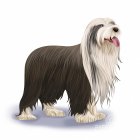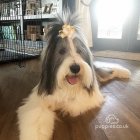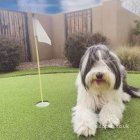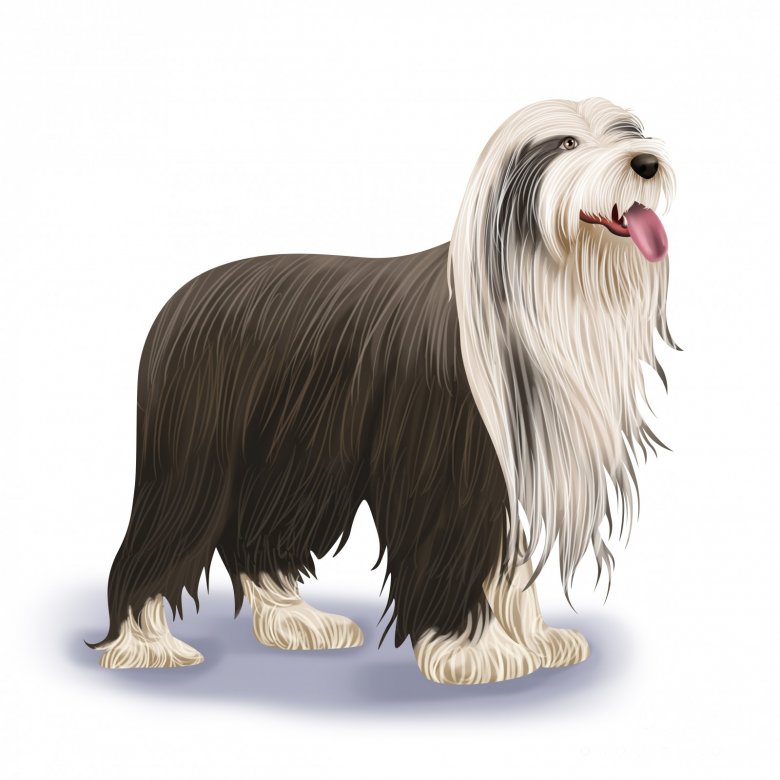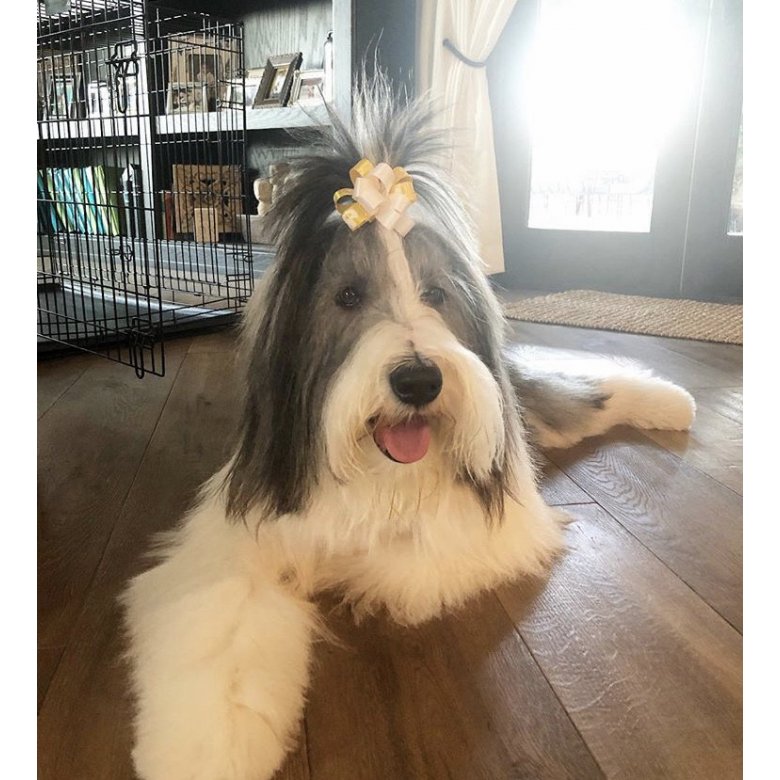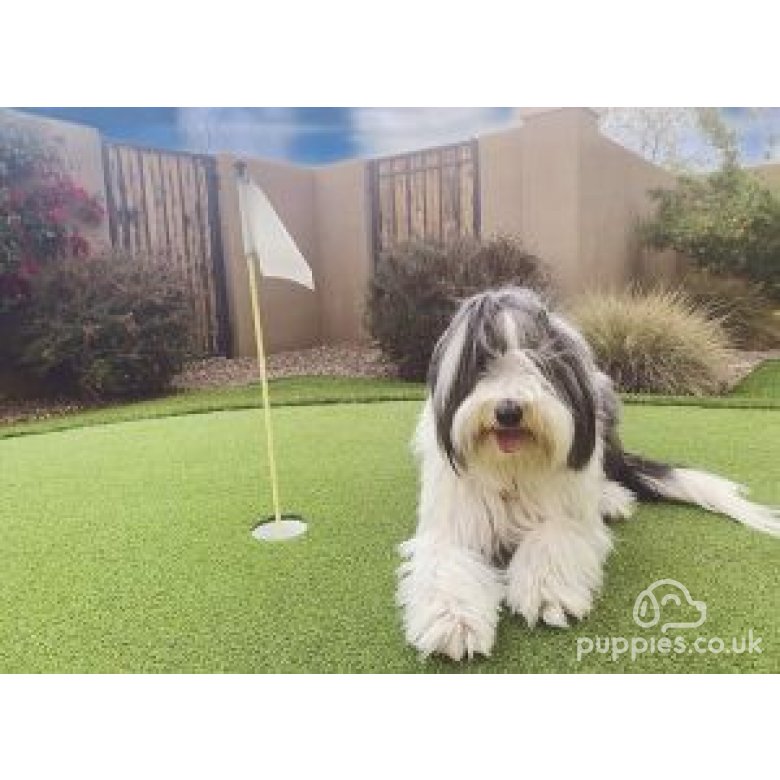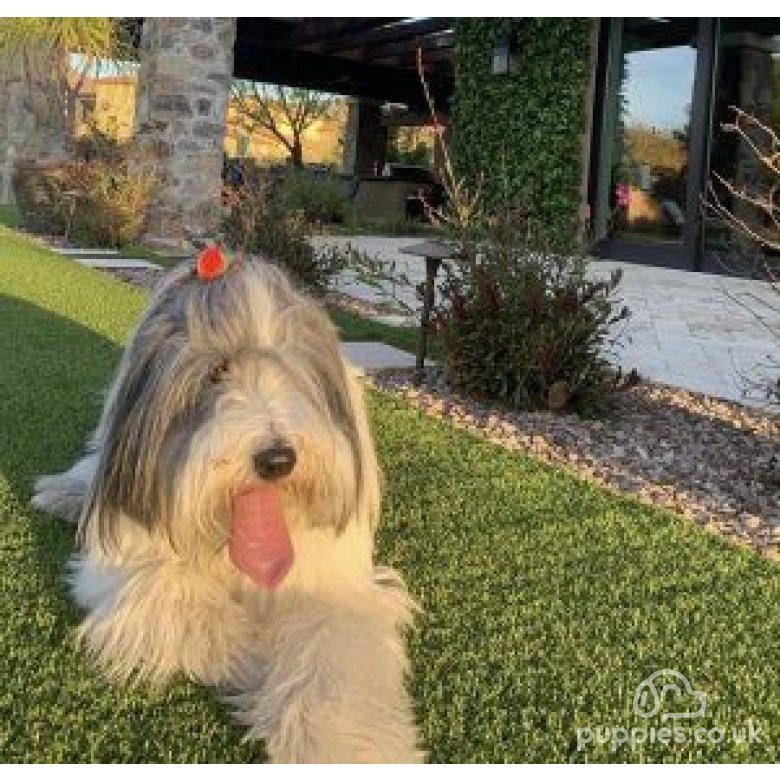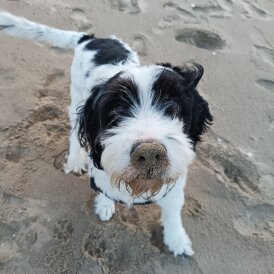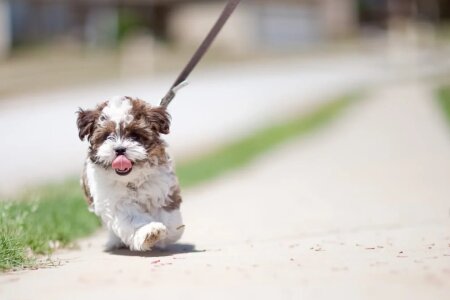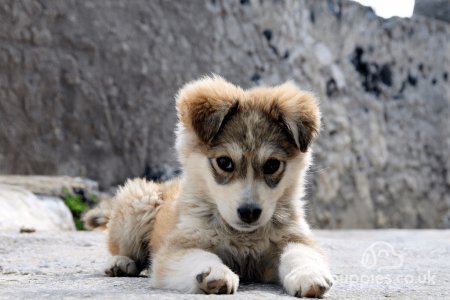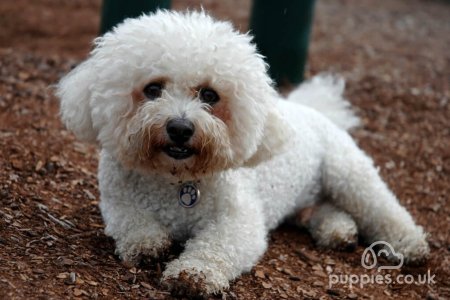While the appeal of beards comes and goes, Bearded Collies will always be in style. These kind, loving pastoral dogs have a unique appearance, thus giving them their nickname of “Beardies.” Although bred to be hardy working dogs in the Scottish Highlands, they’ve adapted well over the years to becoming a compassionate breed that gets along well with owners and families. Blending all of the qualities of a pastoral breed with the adaptability of a family companion, Bearded Collies are a great all-around puppy choice for families living in larger homes. This breed is happy by nature and is sure to bring smiles to owners and their children.
Why Bearded Collies are Great
Some highlights of Bearded Collies:
Sociable: this breed thrives on interaction with others and is happiest and healthiest when plenty of attention can be given to him.
Family-friendly: Bearded Collies get along well with families, including with children.
Watchdogs: as a pastoral breed, Bearded Collies are keen watchdogs that will not hesitate to alert owners to suspicious activity.
Playful: this breed loves to play and retains this puppylike behaviour well into adulthood.
Beauty: Bearded Collies have a unique appearance as a shaggy dog and as such look and feel warm and cuddly.
Things to Consider when Looking at Bearded Collies for Sale
Some downsides to the Bearded Collie:
Grooming: with such long and shaggy coats of fur, Bearded Collies require plenty of routine grooming best left to professionals.
Shedding: Bearded Collies tend to shed profusely and require lots of brushing and cleaning to keep shedding under control.
Prey drive: as a pastoral breed, Bearded Collies are prone to chasing without hesitation. This can be problematic since they will chase animals and people.
Isolation: as an intelligent, social breed, Bearded Collies don’t tolerate being left alone for very long.
History of the Bearded Collie
Historical accounts of the Bearded Collie date back to the early 16th century. It’s believed that a Polish merchant brought a number of Polish Lowland Sheepdogs to Scotland to trade grain for Scottish sheep. After discovering their tenacity, Scottish traders instead bartered these dogs instead of the grain and began breeding them in the Highlands, giving them the name Highland Collies. Alternate accounts state that these Polish Lowland Sheepdogs were abandoned on the Scottish coast and were subsequently bred with local sheepdogs. Yet another theory stipulates that this breed’s ancestors were left behind from invading armies and were bred with local Scottish sheepdogs. The result of this breeding was the original Bearded Collie. Regardless, it is known that the Bearded Collie soared in popularity in the Scottish Highlands for its superb ability to herd cattle and sheep into the lowlands and to perform in the mountainous terrain and climate. Recognised in 1912, the Bearded Collie soon thereafter faced extinction and only thrived again by accident. Mrs G Olive Willison had requested a Shetland Sheepdog for breeding but instead received a Bearded Collie, which led to its rediscovery and flourishing once again. Her breeding programme set the standard for Bearded Collie breeding henceforth. The Kennel Club of Great Britain recognised this breed in 1959.
Appearance
Bearded Collies can be recognised by their long shaggy double coat of fur, which sometimes covers their face and eyes. Fully-grown Bearded Collies may have such long hair that it reaches down to their paws, resulting in a shaggy, distinctive look that sets them apart from most other breeds. As with many pastoral breeds, their physique is lean, active, and demonstrates their strong and robust build. They look as though they are curious and enquiring, even puzzled at first sight. Bearded Collies look endearing and kind whilst maintaining a strong build as they were bred to be hard-working dogs in the Borders and Highlands.
How big is the Bearded Collie?
Bearded Collies are medium-sized dogs. Males grow on average to 53-56 cm in height, whilst females can grow up to 51-56 cm high.
How heavy is a Bearded Collie?
Fully-grown adult male and female Bearded Collies weigh between 18-27 kg on average.
What colour is the Bearded Collie?
This breed has the following commonly-accepted coat colours:
Slate grey;
Reddish-fawn;
Black;
Blue;
Grey (all shades);
Brown;
Sandy.
White markings are acceptable and often commonly blended with the above coat colours.
Temperament
Bearded Collies have a wonderful blend of qualities that make up their unique temperament. On the one hand, they’re still naturally inclined to perform pastoral duties and will use their prey drive to chase almost anything they can. They’re also hard-working and can learn to perform many tasks with excellence. On the other hand, Bearded Collies have adapted to living with owners and their families as lifelong companions. Consequently, Bearded Collies have a lot of great qualities to offer prospective buyers, whether they’re used as a working dog or as a household pet. Beardies do need plenty of attention, however. They are playful and sociable and love to spend time exercising outdoors, so only purchase a Bearded Collie puppy if you’re able to meet these high requirements.
Do Bearded Collies make good guard dogs?
This breed can be trained to perform some guard duties, but they excel as watchdogs and will alert owners to any suspicious activity.
Do Bearded Collies bark a lot?
Since they were bred to herd cattle and sheep, Bearded Collies have a loud, distinctive bark. At home, they may bark more frequently than many other breeds, but this can be corrected with positive reinforcement and training from puppyhood.
Are Bearded Collies easy to train?
This breed is very capable of learning new commands and is generally easy to train, but they can sometimes show signs of stubbornness.
Are Bearded Collies playful?
Bearded Collies love to play and retain much of their puppylike charm well into adulthood. Play often involves chasing, however, and they may chase anything that moves. Teach them as puppies what is acceptable behaviour and demonstrate authority so that he understands his role.
Are Bearded Collies good with children?
Bearded Collies tend to get along well with children. Young children and toddlers should always be supervised whilst playing to avoid naughty behaviours such as boisterous play or nipping.
Are Bearded Collies good with other pets?
Generally, this breed gets along fairly well with other dogs provided that they’ve been introduced gradually. Cats and other small pets may trigger the Bearded Collie’s prey drive and are not ideal to have around in the same home.
Can I leave a Bearded Collie alone?
Few breeds tolerate extended periods of separation from owners and their families, but the Bearded Collie should not be left alone for anything more than a brief moment. It’s best to always have someone at home to keep him company and to avoid loneliness and boredom.
Do Bearded Collies like water?
Bearded Collies are known to enjoy swimming, but they must always be permitted to jump in on their own and without being forced in. Due to their long coats of shaggy hair, Bearded Collies will need to be washed and dried after coming out of the water in order to prevent bacterial growth and infections.
Health
How long do Bearded Collies live?
Generally, Bearded Collies are expected to live anywhere from 12-14 years.
How much exercise does a Bearded Collie need?
Bearded Collies require a moderate to high amount of exercise every day. An hour or more of outdoor walking or playtime is recommended in order to keep them mentally and physically stimulated.
What are a Bearded Collie’s common health issues?
This breed is prone to a few common health issues that prospective buyers should be aware of, including:
Bearded Collies suffer from a much higher rate of Addison’s disease than most other breeds. Medication is possible and can allow the Border Collie to live out the rest of its years, but frequent visits to the veterinarian can help diagnose the occurrence of the disease before it becomes fatal.
Care
How much space do I need for a Bearded Collie?
Plenty of space is required for a Bearded Collie. Large homes with gardens are ideal.
What should I feed my Bearded Collie?
A fully-grown Bearded Collie should be fed 1.5 to 2 cups of high-quality dog food every day, divided into two or three meals as appropriate. Adjust feeding as necessary to promote good health and to prevent overfeeding.
How much grooming do Bearded Collies need?
This breed has high grooming requirements. The Bearded Collie’s coat of fur is long and becomes tangled and matted easily, but it also attracts debris and food scraps which can promote bacterial growth and infections.
Do Bearded Collies shed?
The Bearded Collie sheds a substantial amount of hair. Daily brushing can help to reduce the total amount of cleaning required.
Average Costs
How much does it cost to keep a Bearded Collie?
As a rough guide in pricing: Cost to buy: roughly £400-500 for a well-bred Bearded Collie puppy Other costs (Vet, Food etc): £80-120 per month
Specific Buying Guide
You can read our general buying guide here, with the most important thing being going to view your Bearded Collie puppy, seeing it with its mother, and checking the quality of the breeder. More specifically, here is some Bearded Collie puppy buying advice:
This breed is prone to a few serious health conditions that can be difficult to spot. Although puppies may appear healthy, hypoadrenocorticism (also known as Addison’s disease) affects the Bearded Collie population at much higher rates than other breeds. Medication can help them live a relatively normal life, but the symptoms may be difficult to observe. Ensure that all medical documentation is available when buying any puppy, but especially for Bearded Collie puppies.
Bearded Collie puppies come in many different colours, many of which are acceptable. Merle/dapple coat colours are undesirable and should be avoided since these are considered to be serious flaws.
Other Reading, Adopting Bearded Collie Puppies and Rescue Organisations
A big thank you to the following sources who helped to shape this article:
Bearded Collie Club: https://www.beardedcollieclub.co.uk/rescue.php
The UK Bearded Collie Website: https://www.beardedcollies.org.uk/portal/index.php?page=17
Kennel Club of Great Britain: https://www.thekennelclub.org.uk/search/breeds-a-to-z/breeds/pastoral/bearded-collie/
UK Dog Trust: https://www.dogstrust.org.uk/
Blue Cross: https://www.bluecross.org.uk/rehome-pet
Federation Cynologique Internationale: http://www.fci.be/Nomenclature/Standards/271g01-en.pdf






